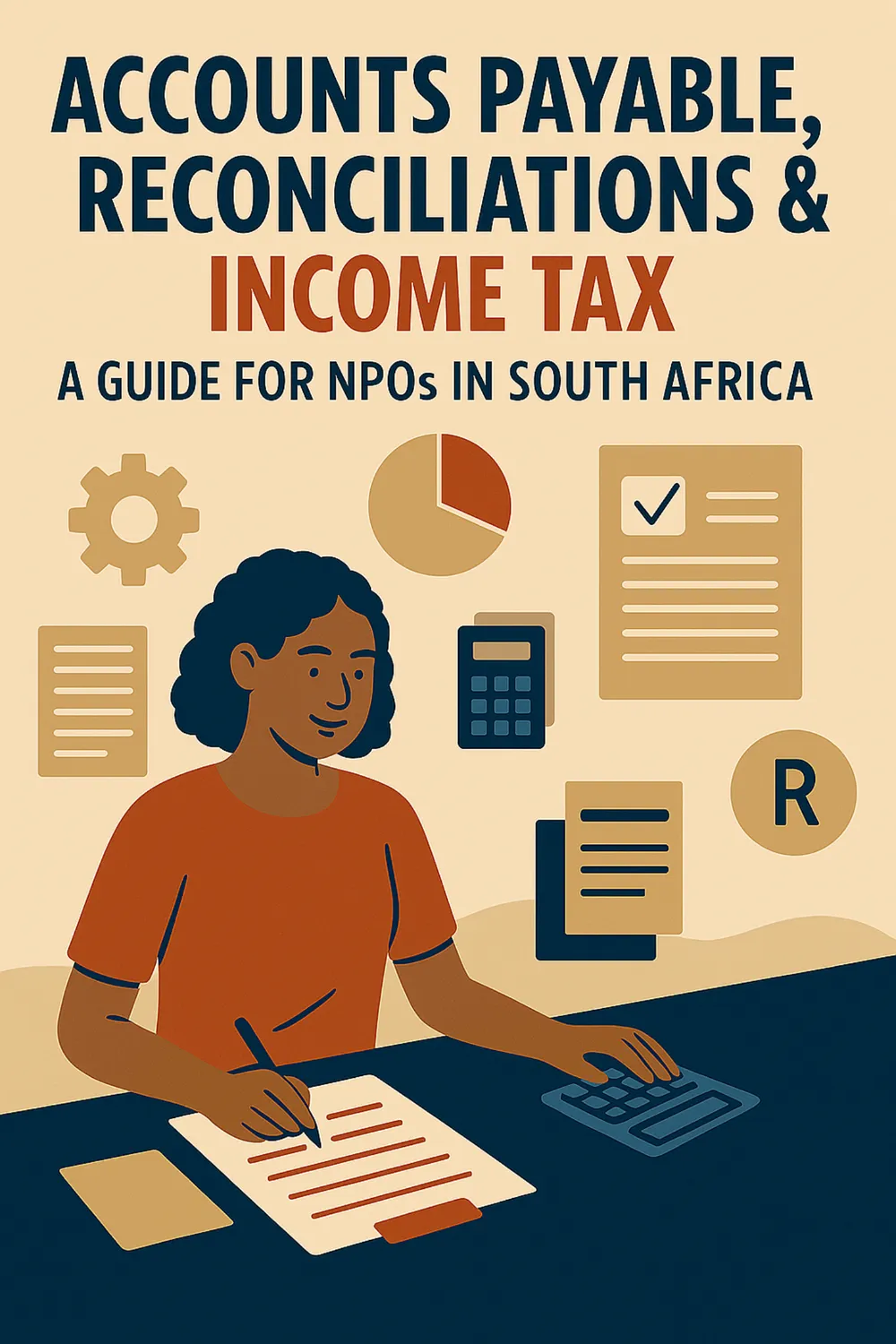Non-profit organisations (NPOs) in South Africa play a vital role in addressing societal needs—whether in education, health, social welfare or community development. However, with this mission comes the responsibility to maintain financial integrity, transparency and legal compliance.
This article offers practical guidance on managing three key financial areas: Accounts Payable, Reconciliations, and Income Tax compliance.
1. Accounts Payable: Managing Your Obligations Responsibly
What Is It?
Accounts Payable (AP) refers to the money an organisation owes to suppliers and service providers. This can include:
- Rent and utilities
- Office supplies and printing
- Consultant fees and transport costs
- Any other operational services
Why It Matters for NPOs
- Delayed payments can damage supplier relationships and credibility
- Good AP practices promote financial stability and uninterrupted service delivery
- Donors and auditors expect clear and responsible financial management
Best Practices
- Implement a clear procurement policy with approval limits
- Use a digital system or manual ledger to track invoices and due dates
- Always verify invoices before approving (check price, VAT, quantities)
- Prioritise payments based on urgency and available funds
- Keep detailed records for audits and financial reporting
2. Reconciliations: Keeping the Financial Books Accurate
What Is It?
Reconciliation is the process of comparing financial records to ensure they match. For NPOs, this includes:
- Bank statements vs. internal cashbooks
- Supplier balances vs. creditor statements
- Grant income vs. project expenditure
Why It Matters for NPOs
- Detects and prevents fraud or errors
- Ensures accuracy in financial reporting
- Builds trust with donors, auditors and regulators
Types of Reconciliations
- Bank reconciliations – Match bank statement entries with internal records
- Creditor reconciliations – Confirm what you owe matches what suppliers report
- Donor or grant reconciliations – Align income received with project spending and donor terms
Best Practices
- Reconcile monthly to detect issues early
- Use accounting software like Pastel, Sage or QuickBooks
- Keep all supporting documentation (receipts, invoices, statements)
- Investigate and resolve discrepancies promptly
3. Income Tax: Yes, NPOs Need to Understand It Too
Are NPOs Tax-Exempt?
No, not by default. NPOs must apply to SARS for Public Benefit Organisation (PBO) status under Section 30 of the Income Tax Act to receive income tax exemption.
Key Steps to Compliance
- Register as an NPO with the Department of Social Development
- Apply for PBO status and obtain a Section 18A certificate if you want to issue tax-deductible donation receipts
- Submit annual income tax returns (IT12EI) to SARS—even if exempt
Why It Matters
- Non-compliance can lead to penalties or deregistration
- Tax exemption builds donor confidence
- Compliance opens doors for corporate, government and international funding
Important Tips
- Maintain detailed records of all income and expenses
- Understand what constitutes taxable trading income (e.g., selling goods or charging for services)
- Ensure all donations and grants are recorded and classified correctly
- Consult with a tax advisor who understands NPO regulations
Conclusion
Effective management of Accounts Payable, Reconciliations, and Income Tax is not just about ticking compliance boxes—it’s about strengthening your NPO’s sustainability and trustworthiness.
By adopting sound financial practices and seeking expert guidance when needed, your organisation can stay accountable and focus on what matters most: creating meaningful, lasting change in your community.
Resources and Support
We are excited to inform you about the NPO Development Course!
Whether you’re starting a new nonprofit or strengthening an existing one, this course is designed to equip you with the skills and knowledge needed to excel in the nonprofit sector.
What You Will Gain:
Throughout the course, you will:
1. Understand Compliance Requirements: Gain a clear understanding of legal and regulatory obligations to ensure your nonprofit remains compliant.
2. Learn Good Governance Policies: Explore best practices for financial management and operational policies to maintain accountability and transparency.
3. Master HR and Volunteer Management: Develop the skills to create effective HR contracts, manage staff, and foster strong relationships with volunteers.
4. Improve Marketing and Communication: Learn to effectively market your services and communicate your mission to key stakeholders.
5. Engage Donors and Clients Professionally: Acquire techniques to build and maintain respectful and sustainable relationships with donors and clients.
Additional Course Benefits:
- Online Access for 6 Months: You will have six months of unlimited online access to the course materials, allowing you to learn at your own pace.
- Certificate of Completion: Upon completing the course, you will receive a certificate to showcase your achievement and new skills.
- Templates: Access to 60+ templates
Course Fee:
The course fee is R3500-00 – NPO Development.
For more information contact [email protected] or phone the office at (016) 976-2064.
